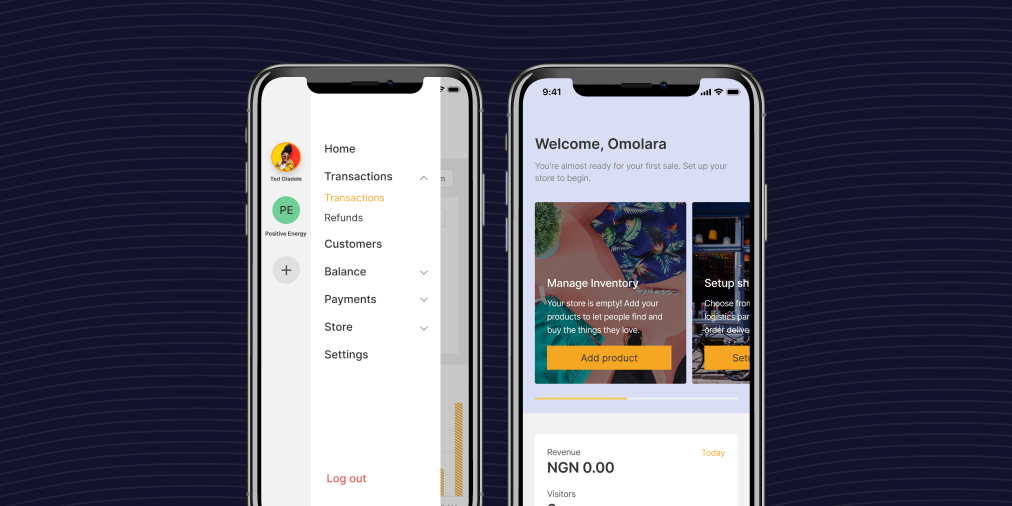Hello everyone, let’s get a little personal.
Last week, I spent time in Warri – a city located in South-South Nigeria, notable for being an oil hub and popularizing the incredibly complex but impressive Warri pidgin language. My trip turned out to be an unexpectedly stressful event and by Sunday, I fell sick.
Now falling sick wasn’t an issue; the issue was that I’d fallen sick on a Sunday and my accommodation was located in a small, but populated, community that didn’t have a pharmacy within walking distance. Also, the mom and pop shops that littered every street around the hotel didn’t open before noon on Sundays.
As my people say: I was in hot soup.
The hotel concierge had to walk a mile to buy a pack of Panadol for me, and for the hotel’s First Aid box.
Partner Message

The Flutterwave Mobile app, the app that turns any smartphone into a mobile POS is now redefining commerce. The Flutterwave Mobile App makes it super convenient for anyone to take their business with them anywhere, anytime. Learn how you can take your business anywhere, anytime here.
First dibs on Mega Cities
But while I was waiting and battling aches and pains, I couldn’t help but wish I had access to a healthtech or telemedicine company that could deliver the medication I need right to my hotel room. Or better still, send a healthcare professional to run some tests and properly diagnose my symptoms.
My experience revealed two things: Nigeria needs more healthtech startups. And those startups need to have foot traffic in other cities and communities, outside Lagos and Abuja.
With a population of about 14million people, Lagos is Nigeria’s busiest and most populated financial and commercial hub. The mega city also has thriving tech hubs scattered across diverse communities.
So of course you’re going to see a growing number of founders setting up their business headquarters in Lagos. It makes business sense to penetrate at least 1% of the most populous market in Nigeria.
But there’s a tendency for these founders to grow comfortable in Lagos, or eventually expand their businesses into neighboring South-West states like Ekiti, Ogun, and Ondo.
Comparatively speaking, there are more Fintech startups than healthtech/telemedicine in Nigeria. And out of that small crop of healthtech startups, at least 50% of them were founded in Lagos, and are currently serving customers in the megacity.
Partner Message

KB4-CON EMEA is a free, highly engaging, cybersecurity-focused virtual event designed for CISOs, security awareness and cybersecurity professionals in Europe, the Middle East and Africa. The event will be on Thursday, September 23rd and features keynotes from two of the most well known figures in cybersecurity. Mikko Hyppönen will cover how our global networks are being threatened by surveillance and crime, and how we can fix our technical, and human, problems. Kevin Mitnick will reveal social engineering tradecraft and insights and wow you with a live hacking demonstration. You can register here.
Incremental innovation
Of those Lagos headquartered health startups, only a small number of them are focused on delivering medication and home-based tests to their users.
Even with over 2,000 registered private hospitals and more than 200 public health centers in Lagos, there’s still a high percentage of underserved Lagos residents who can’t afford basic medical care. Those who can afford a one-time hospital visit would rather self medicate or purchase analgesics (panadol, ibuprofen, etc) from a street vendor, but they stand the risk of buying expired drugs.
It’s hard to ignore the need for telemedicine businesses in Lagos. But it’s also crucial to remind prospective founders who want to break into Nigeria’s health ecosystem that communities outside Lagos also need attention.
For Ifeoluwa Dare-Johnson, founder and CEO of Healthtracka, launching in Lagos was deliberate, but her team is also keen to expand into more Nigerian cities and marginalized communities.
“We’ve had a couple of people reach out to us from Abeokuta and Ibadan – they have a need for our services. They need tests done, but the nearest hospital is too far from them.” Ifeoluwa said over our Zoom call.
Healthtracka is a digital health platform that offers convenient at-home lab tests and provides their users with easy-to-read results.
“One of the things about innovation in healthcare is that it has to be incremental. We have to first build confidence and trust in our prospective users. And building that trust will look different for people who live in Lagos and people who live outside Lagos.”
Innovating incrementally requires healthtech founders to spend time immersing themselves in unfamiliar markets and listening to the needs of their future customers.
“Over the next one year, I hope Healthtracka can expand into other cities outside Lagos. I’m thinking Abeokuta, Ibadan, and even Warri. Lagos is an innovation centre, so it’s good to start building here. Test your product in Lagos, and then expand into other communities using the lessons you’ve learned.”
So my challenge to emerging and prospective healthtech founders is this: can you spread health and digital innovation outside the commercial walls of Lagos?
It could be argued that larger commercial cities have higher purchasing power – and this argument is valid – but if innovation does not spread into the corridors of smaller emerging cities, their purchasing power will not be strong enough to partake in the digital economy.
Partner Message

Did you know that the US Stock markets have returned on average 10% annually for nearly a 100 years? Are you aware that Bitcoin has been the best returning asset-class in the past decade. Learn the basics, stay updated for free at 30%Club here.
FROM THE CABAL:
Amidst regulatory crackdowns and overnight policy changes, Nigerian Fintech customers aren’t jumping ship or pulling their funds out of wealthtech and savings apps. (Michael Ajifowoke, TechCabal).
Instant loan apps are growing increasingly popular in Nigeria. Carbon, Branch and Fairmoney are just a few lending in the lending ecosystem. (Damilare Dosunmu, TechCabal).
Ethiopia has plans to build local competitors to WhatsApp, Twitter, Facebook and Zoom. (Daniel Adeyemi, TechCabal).
pawaPay raised $9 million in seed funding from MSA and Zagadat Capital, Mr Eazi’s investment firm. (Damilare Dosunmu, TechCabal).
Have a great week
| Thank you for reading the Next Wave. Please share today’s edition with your network on WhatsApp, Telegram and other platforms, and reply to this email to let us know what we can be better at. Subscribe to our TC Daily Newsletter to receive all the technology and business stories you need each weekday at 7 AM (WAT). Follow TechCabal on Twitter, Instagram, Facebook, and LinkedIn to stay engaged in our real-time conversations on tech and innovation in Africa. – Koromone Koroye, Managing editor, TechCabal |











